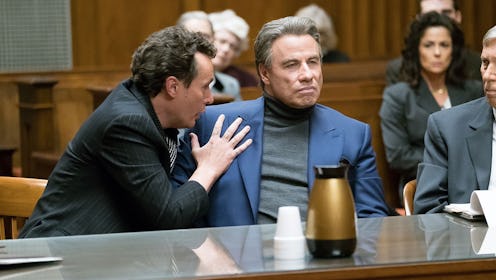Entertainment
Here's How Accurate The New John Gotti Biopic Really Is
It's been a difficult struggle for John Travolta to get the story of infamous mob boss John Gotti to the screen with Gotti, finally out on June 15. Six years, a revolving door of directors and producers, and a constantly changing cast were only some of the movie's troubles. Now that the film's finally hitting theaters, how accurate is Gotti in telling the story of the notorious Teflon Don?
For those unfamiliar, especially those who didn't grow up in the New York metropolitan area where Gotti's every move was news, from 1985 until his death in 2002 he was leader of the notorious Gambino crime family. They were one of the "Five Families" that ruled New York's criminal activity. While most made men liked to keep a low profile, Gotti was known for his flamboyant outfits and personality, earning the media nickname "The Dapper Don."
Allegedly securing his position by ordering a violent hit on Gambino leader Paul Castellano, Gotti was one of the most ruthless and powerful crime bosses in the United States. He became known as The Teflon Don after successfully beating the rap on three high-profile trials in the 1980s meant to put him away for life on claims of racketeering, drug trafficking, prostitution, extortion, and illegal gambling, charges, to name a few. Eventually, in 1992, he was convicted of charges including murder and obstruction of justice, and was sentenced to life in prison, where he later died from cancer.
The new movie Gotti is based on John Gotti Jr.'s autobiography, Shadow Of My Father, originally the film's working title. Travolta plays the titular Don from his early years rising up in the mob to his prison deathbed. Speaking to Variety, Gotti Jr. said, “This is not going to be an expose of the mob or a shoot-em-up," emphasizing that "the story’s about redemption."
Still, the film doesn't shy away from showing some real-life brutality in grim detail, like Gotti's infamous hit on his boss in front of Sparks Steak House. But it's often filtered through the eyes of a loving son, so the movie mostly shows Gotti, the stern but loving dad, rather than Gotti, the terror of the underworld. The film's focus on home life will appeal to fans of The Sopranos, but unlike the show, the movie doesn't dig too deeply into how Gotti balanced his amoral core with the trappings of respectability.
Because it's based on Gotti Jr.'s writing, the most true-to-life part of the movie is father and son working together, especially their prison talks about Gotti Jr.'s future. In one scene, an emaciated Gotti explodes when his son considers taking an FBI plea deal to put the mob life behind him (something the real-life Gotti Jr. ended up doing), saying it goes against the Mafia's codes of honor. Ironically the movie doesn't really focus enough on Gotti's own breaking of those codes, including taking actions without consulting the other families and getting heavily involved in drug dealing, something previous eras of Mafia families stayed away from.
The film does features historical events in Gotti's life that he never publicly admitted, including his alleged first hit, so some poetic license was clearly taken even if the events actually happened. The movie interweaves real-life footage and news clips throughout, though, adding some direct verisimilitude. Gotti Jr. can only honestly share the parts of his father's life he was aware of, which the film inadvertently points out by including a scene where a young Gotti Jr. first learns of his dad's real job via TV news, while getting ragged on by classmates at the New York Military Academy.
Gotti might not be filled with deep insight into the man, but for those who have no idea who the gangster was, it's a decent overview of history.
